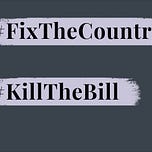[Image description: Text ‘#FixTheCountry #KillTheBill’ on a navy blue background with lilac paintbrush stroke highlights]
While I’m out here in Ghana, I’m commissioning Ghanaians/British Ghanaians/folks of mixed Ghanaian heritage to create content for these guest mailouts.
Edem prefers to vocalise her thoughts over writing them down, so above is her audio piece on the power of protest, along with a verbatim transcript below.
Transcript
00:00 mins
[AUDIO STARTS]
00:02 mins
I was meant to be speaking to you about a protest that I attended in Accra, Ghana, in West Africa. This protest was due to take place on the ninth of March, however, it did not go ahead. This protest was born out of a movement called #FixTheCountry.
00:19 mins
Which is a movement that was calling on the [Ghanaian] government to end corruption and work in the interest of the majority of Ghanaians. This movement was pointing out that the government has negated on its duty, as it relates to healthcare, roads, infrastructure and education. And it was calling on the government to do the right thing.
00:39 mins
So people were going to take to the streets to show their opposition. To show that the country was broken. And that the people that they had just elected only last year in December, needed to do something to fix it. However, the government got an injunction, citing COVID to stop the protests from happening.
01:00 mins
So the protest didn’t happen. Now, I strongly believe that the protests should have happened. And given that the government engaged in a voter registration program, subsequently, an election which included lots of rallies, and lots of towns and cities in this country in which people observe zero social distancing.
00:19 mins
So you see, I’m skeptical that they were concerned about COVID the moment we wanted to protest them. And it made me think about the #KillTheBill movement in the UK. The government announced a bill in which [the Prime Minister] was going to give police more powers to curtail our right to protest.
01:38 mins
In fact, it almost stopped us from being able to protest, but people said “No”. And they took to the streets, because we have a right to take to the streets when things aren’t working for us. We have a right to take to the streets to demand better, and that’s what the #KillTheBill movement did. They got out to the streets and they said “No” to this bill.
01:59 mins
And the bill included giving 10 years, to the people who pull down statues. And that was a direct shot at the Black Lives Matter movement, which pulled down the statue of Edward Coulston, a slave trader, in the city of Bristol.
02:18 mins
Now, I want to talk a little bit about the criminalisation of LGBT advocacy [in Ghana]. Earlier on this year, the government shut down an LGBT center [in Accra], citing that homosexuality is against the law. Now, it doesn’t say directly that homosexuality is illegal, but it’s their interpretation of the penal code, which was leftover from British colonialism – something that was exported from Britain to Ghana.
02:50 mins
Something that Britain, through struggle, because ‘Section 60’ happened in which LGBTQ people were criminalised [Almaz note: Correction – various sex acts have been criminalised throughout British history. See: ‘Buggery Act of 1533’, ‘Offences Against the Person Act 1837’, ‘Sexual Offences against the Person Act 1861’ and ‘Sexual Offences Act 2003’] They weren’t allowed to be talked about, allowed to be taught in schools [Almaz note: Section 28, which was repealed in 2003] and in government organisations. But people struggle. We had the pride movement, people struggled. People protested. And eventually, they won.
03:17 mins
And that is what we must do here in Ghana. We must struggle. We must fight for what is right for people’s rights to exist. And it’s very interesting to me because protest is such a hot topic here in Ghana, right. Even to have a protest on any issue, perhaps one that has nothing to do with the government, you need to get permission from the police, although the law doesn’t say so, right. We are guaranteed the right to protest in the law.
03:48 mins
But it’s common practice to ask the police for permission before approach. If you don’t do this, you will face severe consequences from the law for not asking for permission to protest. But asking for permission to protest defeats the whole point of a protest. I mean protesters should make it known that they’re going to, in order for health and safety. However, explicit permission from the police to protest… it’s a sign of backwardness as far as I’m concerned.
04:18 mins
However, this is something that people deal with here in Ghana. And it’s so interesting to me because the very foundation… the very… years that culminated in our independence [were] filled with mass protests. We protest[ed] for our right for self-determination, and our protest the very thing that is criminalised.
04:39 mins
Because the people in power now know that it works. Know that it can move people. Know that we can use it to hold them accountable, so they tried to suppress us through the protests. And that’s exactly what the #KillTheBill movement is about, is exactly what the opposition of the bill in the UK is about, because the government saw the massive Black Lives Matter movement and protests yesterday… I mean, there were Black Lives Matter protests in towns and cities in the UK, that there’d never been before, because people were completely outraged by what was happening.
05:16 mins
And that is why they want to curtail our freedom and our rights to protest, because protests work. And when we say protests work, I would like you to take a moment to Google the protesters in Glasgow, that stopped a family from being deported… from being taken into detention and being deported from the UK. On Eid.
05:39 mins
The UK government, specifically went out to detain a Muslim family, with the intention of deporting them on Eid. And that community in Glasgow took to the streets. You had people physically put their bodies, underneath the van to stop it from moving for hours. The whole day the streets were filled with people who were chanting, who were was saying, “No, we’re not going to let you take these people. These people are part of our community.”
06:08 mins
And that’s really it; protests work. Getting out on the streets works. A part of me feels very sad because right now the government in Ghana won. They won the first round. They minimised the movement. They stopped us from going to the streets. But they’re going to carry on to take the actions that they want to take, which is going to impact the lives of so many Ghanaians. And it makes me incredibly sad.
06:36 mins
But I really hope that people learn their lesson here, that you can’t negotiate with people for your freedom; you have to take a stand. You have to stand in the streets and you have to demand it. And that’s the way that you’re going to win.
06:50 mins
[AUDIO ENDS]
Enjoying ‘She Dares To Say’? Share this post with your friends
Today’s thoughts were shared by Edem Ntumy, a political activist whose work ranges from anti-racism, feminism and Black liberation. She is currently the Co-Director of award-wining community organisation, Decolonising Contraception, and co-host of the podcast The Sex Agenda.
Follow Edem on Twitter and Instagram. Or support Edem’s work by making a donation via PayPal.
‘She Dares to Say’ is an email newsletter by Almaz Ohene, a Creative Copywriter, Freelance Journalist and Accidental Sexpert.
Follow Almaz on Twitter, Instagram, and Facebook.
If you would like to support ‘She Dares to Say’, please consider becoming a paid subscriber, or if you would prefer to make a one-off donation, you can also send a contribution via PayPal.
















Share this post